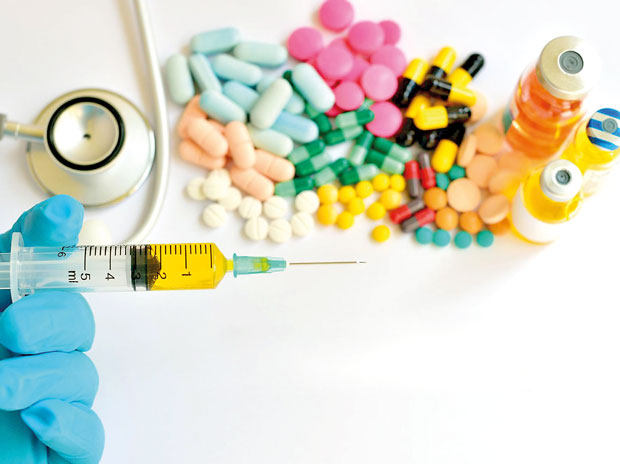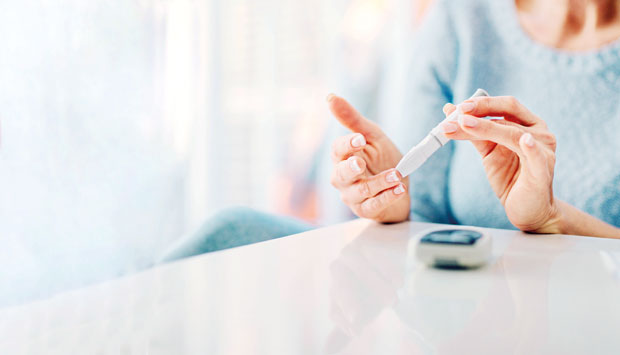05 Jan 2018 - {{hitsCtrl.values.hits}}

 An elevated level of blood glucose is called diabetes, caused by defects in insulin secretion or inability of absorbing insulin to the body. Diabetes is divided into two categories as Type 1 Diabetes and Type 2 Diabetes. In type 1, the body doesn’t produce insulin and in type 2, the body doesn’t make or use insulin well. Type 2 is considered more common. A blood test will determine whether someone has diabetes.
An elevated level of blood glucose is called diabetes, caused by defects in insulin secretion or inability of absorbing insulin to the body. Diabetes is divided into two categories as Type 1 Diabetes and Type 2 Diabetes. In type 1, the body doesn’t produce insulin and in type 2, the body doesn’t make or use insulin well. Type 2 is considered more common. A blood test will determine whether someone has diabetes.
Insulin is a hormone produced by the pancreas. Insulin helps the body to store and use sugar and fat received from the food you eat. When the pancreas doesn’t produce or produce a little insulin or the body doesn’t use or react properly to insulin, diabetes can occur.
Insulin and oral hypoglycemic drug 
Type two requires taking oral medicine to lower the blood glucose level. Sometimes, it is mandatory to prescribe insulin for patients who are being treated with oral medications, when the patient faces severe lack of insulin.
Sometimes oral insulin takers are prescribed with the insulin injection if there is an infection, during an operation or during pregnancy.
Whatever type of diabetes, the first step of controlling diabetes is controlling the diet. The importance of abandoning all kinds of sugar has been emphasized. Therefore, diabetic patients are encouraged to consume complex carbohydrates like unrefined rice, as well as limiting the fat consumption as much as possible. The daily calorie intake of a person depends on how much energy he is using within 24 hours. People with diabetes need to maintain a healthy lifestyle.
Insulin and oral hypoglycemic are two drugs being used to treat diabetes and the doctor will prescribe the most suitable medicine to the patient.
Treating diabetes will help control the blood sugar level of the patient and bring it closer to the limit of a healthy person. This will ease the symptoms of troublesome and frequent urge to urinate and excessive thirst and control weight loss. It has been confirmed that controlling blood sugar levels will phase out life-threatening diseases like kidney failure, blindness, heart attacks and strokes caused by diabetes.
Dropping of blood sugar level
Prescribing medication for diabetic patients with the aim of reducing the sugar level is known as hypoglycemia. During a huge drop in blood sugar level, a diabetic patient might face excessive hunger, sweating, lifelessness and feel faintish. If the patient is found to be conscious, he should be given glucose, tea or coffee with just a teaspoonful of sugar. If found to be unconscious or sleepy, the patient must be accompanied to the doctor immediately. The patient must follow medical instructions when having meals and have them on time and make sure he or she has the correct dose of medicine. These habits will help avoid further complications.

Insulin treatment
Insulin is a protein which dissolves in the mouth and therefore it is given as a subcutaneous injection and is injected underneath the skin. The injection is labelled according to the consuming source, as human, bovine (cattle) and porcine(Pig). Quickly activating insulin is usually taken before a meal while taking insulin that takes a long time to activate is taken once or twice a day, usually in the morning and at night before meal. Both these types of insulin are given to diabetes patients to control the sugar level systematically. Oral hypoglycemics are also prescribed and the dose of insulin is given at night to control blood sugar.
It is advisable to test the sugar level at home, by the diabetic patient self. It can be done using the glucometre, a simple equipment testing a droplet of blood on a glucose strip. Glucometers are available under various brand names, but the consumer must be careful to choose a metre with a glucose strip.
Guidelines for patients.
1.Insulin should be taken before meals.
2.patients are advised to take meals within 10 to 15 minutes of injecting insulin.
3.If the blood sugar levels are beyond the usual, the insulin dose can be corrected according to that, but it has to be done only under the instructions of a doctor.
4.The blood glucose level depends on the last insulin dose. Eg. The blood sugar level during daytime or at night depends on the insulin level consumed in the morning.
Oral hypoglycemic agents
There are several groups of medicine.
Biguanides like Metformin - these increase the glucose consumption in peripharal parts in the body.
Sulphonylureas like Tolbutamide, glibenclamide, gliclazide, and glipizide.
Glitazones like pioglitazone and rosiglitazone
Alpha-glucosidase inhibitors like acarbose
There are a number of other medicines that are not so common - like sitagliptin.
Biguanide medicines like metformin are taken after and not exceeding 15 to 30 minutes, of a meal, while acarbose is taken with a meal. All the other medications are taken before meals. The other medicines except metformin are prescribed once or a twice daily in the morning or before dinner. Any medicine is started with a small dose. The doctor will change the dose of medicine according to lab reports.
It is essential to abide by a conventional instructions list, no matter what the system of treatments the patient is undertaking. A diabetes patient must have meals on time in order to remain healthy. The blood sugar level decreases by being late to have meals and then there’s a given portion of food which cannot be exceeded by the patient. No patient can decide to have a light lunch and a heavy dinner, because overeating cannot be undone by using a powerful dose of medicine, except for the occasions when a patient has worked hard physically.
The article is based on a leture delivered by Dr. M. Sarath Gamini De Silva, Consultant Physician, National Hospital, Colombo at a seminar held at the Health Education Bureau
23 Dec 2024 16 minute ago
23 Dec 2024 21 minute ago
23 Dec 2024 1 hours ago
23 Dec 2024 2 hours ago
23 Dec 2024 2 hours ago